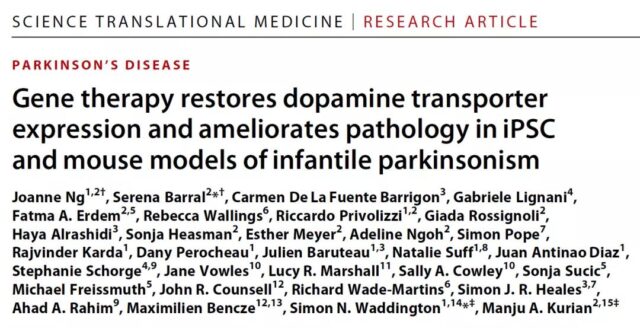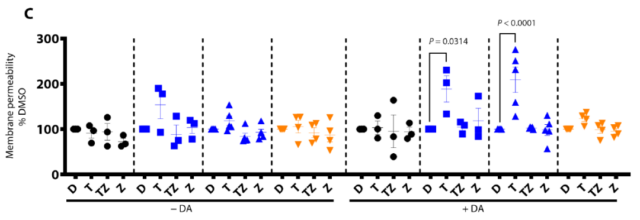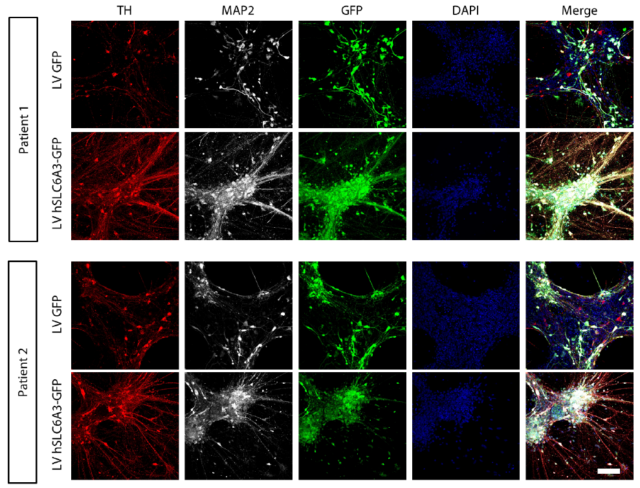Science journal: AAV gene therapy improves infant Parkinson’s disease
- Why Botulinum Toxin Reigns as One of the Deadliest Poisons?
- FDA Approves Pfizer’s One-Time Gene Therapy for Hemophilia B: $3.5 Million per Dose
- Aspirin: Study Finds Greater Benefits for These Colorectal Cancer Patients
- Cancer Can Occur Without Genetic Mutations?
- Statins Lower Blood Lipids: How Long is a Course?
- Warning: Smartwatch Blood Sugar Measurement Deemed Dangerous
Science journal: AAV gene therapy improves infant Parkinson’s disease
Science journal: AAV gene therapy improves infant Parkinson’s disease. Dopamine transporter (DAT) is encoded by the SLC6A3 gene, which is highly expressed in presynaptic midbrain dopaminergic (mDA) neurons and is responsible for the reuptake of dopamine (DA) from the synaptic cleft.
The biallelic loss-of-function mutation of the SLC6A3 gene can cause dopamine transporter deficiency syndrome (DTDS), which is an extremely rare neurodegenerative disease. Patients exhibit infantile Parkinson’s disease. Due to lack of treatment, patients often Will die in childhood.
So far, only 29 cases of dopamine transporter deficiency syndrome (DTDS) have been reported, but because many patients are misdiagnosed as cerebral palsy, the actual incidence of the disease may be higher.
On May 19, 2021, researchers from University College London, UK, published a research paper titled: Gene therapy restores dopamine transporter expression and ameliorates pathology in iPSC and mouse models of infantile parkinsonism in the journal Science Translational Medicine, a subsidiary of Science.
The research team created a mouse model of dopamine transporter deficiency syndrome (DTDS) by knocking out the SLC6A3 gene. The mouse model showed symptoms of Parkinson’s disease, including tremor, slow movement and premature death.
Then, an adeno-associated virus (AAV) carrying the SLC6A3 gene was injected into the lateral ventricle of the neonatal mouse model, which can enhance the expression level of dopamine transporter (DAT) and save them from dyskinesia and neurodegeneration. These results indicate that AAV gene therapy is a promising method for the treatment of dopamine transporter deficiency syndrome (DTDS).

First, the research team explored the effects of dopamine transporter (DAT) mutations on neuronal function. The research team recruited two SLC6A3 homozygous mutations of dopamine transporter deficiency syndrome (DTDS) patients, extracted their dermal fibroblasts and Induced into iPSC stem cells, it was found that the dopamine transporter (DAT) activity of these cells was significantly interrupted and the dopamine metabolism was imbalanced.
Next, the research team analyzed the effects of DAT dysfunction and dopaminergic dysfunction on other key enzymes involved in dopamine metabolism, and found that the disease specificity of monoamine oxidase A decreased, while in glial cells, the disease specificity of monoamine oxidase B decreased.

Because the total number of neurons in the patient-derived cell line was significantly reduced, the research team further studied the role of dopamine toxicity in the pathogenesis of dopamine transporter deficiency syndrome (DTDS), and found that DAT activity is impaired in DTDS and neurotoxicity and apoptosis Related to neurodegenerative changes.

After establishing a dopamine transporter deficiency syndrome (DTDS) cell model, the research team used the model to validate the targeted therapy of DTDS. Due to protein folding defects, endoplasmic reticulum retention and reduced surface expression of mature glycosylated transporters, most of the missense variants in DTDS are related to the loss of transporter function. Therefore, the research team tested whether heat shock protein 70 (HSP70) inhibitor pifithrin-u can rescue defective protein folding and restore dopamine transporter (DAT) function in vitro, and found that pifithrin-u rescued DAT function.
Subsequently, the research team delivered the SLC6A3 gene through a lentiviral vector and found that gene therapy rescued the dopamine transporter (DAT) function and successfully prevented dopaminergic neurodegeneration.

In general, the study clarified the pathogenesis of infantile Parkinson’s disease, and developed gene therapy targeting the disease target, which may be applied in the future to treat patients with dopamine transporter deficiency syndrome (DTDS).
(source:internet, reference only)
Disclaimer of medicaltrend.org



